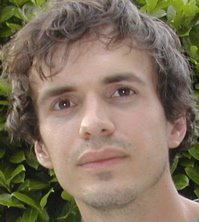First workshop with Alice
I just finished teaching my Thursday class-- today we went over Eudora Welty's "June Recital," quite a behemoth to put on the shoulders of freshmen, even students as bright as the ones here. I'm really enjoying this challenge, and I'm optimistic that I may finally be finding a life's calling here. Then again, I feel pulled in so many different directions-- writing, the environmental community, the Deaf community, teaching. If I can find a way to ultimately integrate all of these things in my life (with love, a garden, and a nice little eco-friendly house), I will be a very happy man.
Tuesday afternoon we had our first workshop with Alice McDermott. She could blend in anywhere in America-- a middle-aged woman, perhaps suburban, someone you'd say hi to in the supermarket. She has a very down-to-earth quality, and a way of really grounding the workshop discussion. My first impression is that she's a great teacher and she really understands the essentials of writing.
Our workshops are pretty straightforward-- we begin the class with a discussion of the weekly story in The New Yorker (everyone, especially Alice, thought this week's story sucked). Then we move on to discussing the stories to be workshopped for the week. That's something I won't go into detail about, since this is our personal work here. Once again I found myself incredibly impressed by the way Alice hones the conversation and gets to the essence of the story. Will I have this kind of internal framework in thirty years? I hope so. It's amazing how much I've already grown my first month in Baltimore, in terms of the way I look at writing and reading. It's as if somebody opened my eyes and revealed the inner workings of the machine, something which I've always known intuitively how to run but not necessarily to fix and repair.
This is what really hit home about Alice, though. Later that evening, my roommate Danny and I were discussing the workshop and Danny asked if I'd read Alice's review. I didn't know what he was talking about. He told me there was a review of Alice's latest book in The New Yorker, and that it put her work in glowing terms. What are the chances that the first New Yorker we'd read for class would also contain a review of her book? And yet it didn't come up in the workshop. She didn't mention it. I can't pinpoint exactly what quality that is, but it just gives me tremendous respect for her.
Next week I'll be turning in my first story, and the week after that I'll be workshopped in class. That's something I'm really looking forward to, though I'm having a difficult time deciding what piece to put up. I'm very mindful that I want to make a good first impression-- not so much with the quality of my writing but with the kind of writer I am. Much of my work so far focuses three themes-- being Deaf, the environment, and traveling. Which side do I want to show first? Who am I really, and what stories do I have to give forth to the world that might actually have some value and benefit to readers?
Tuesday afternoon we had our first workshop with Alice McDermott. She could blend in anywhere in America-- a middle-aged woman, perhaps suburban, someone you'd say hi to in the supermarket. She has a very down-to-earth quality, and a way of really grounding the workshop discussion. My first impression is that she's a great teacher and she really understands the essentials of writing.
Our workshops are pretty straightforward-- we begin the class with a discussion of the weekly story in The New Yorker (everyone, especially Alice, thought this week's story sucked). Then we move on to discussing the stories to be workshopped for the week. That's something I won't go into detail about, since this is our personal work here. Once again I found myself incredibly impressed by the way Alice hones the conversation and gets to the essence of the story. Will I have this kind of internal framework in thirty years? I hope so. It's amazing how much I've already grown my first month in Baltimore, in terms of the way I look at writing and reading. It's as if somebody opened my eyes and revealed the inner workings of the machine, something which I've always known intuitively how to run but not necessarily to fix and repair.
This is what really hit home about Alice, though. Later that evening, my roommate Danny and I were discussing the workshop and Danny asked if I'd read Alice's review. I didn't know what he was talking about. He told me there was a review of Alice's latest book in The New Yorker, and that it put her work in glowing terms. What are the chances that the first New Yorker we'd read for class would also contain a review of her book? And yet it didn't come up in the workshop. She didn't mention it. I can't pinpoint exactly what quality that is, but it just gives me tremendous respect for her.
Next week I'll be turning in my first story, and the week after that I'll be workshopped in class. That's something I'm really looking forward to, though I'm having a difficult time deciding what piece to put up. I'm very mindful that I want to make a good first impression-- not so much with the quality of my writing but with the kind of writer I am. Much of my work so far focuses three themes-- being Deaf, the environment, and traveling. Which side do I want to show first? Who am I really, and what stories do I have to give forth to the world that might actually have some value and benefit to readers?

